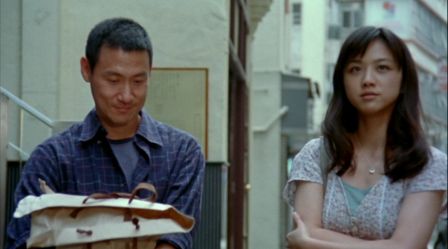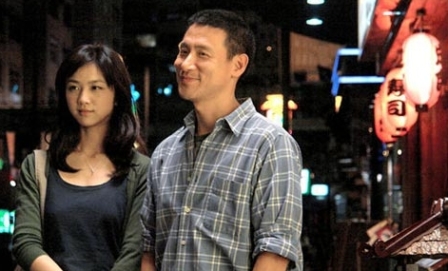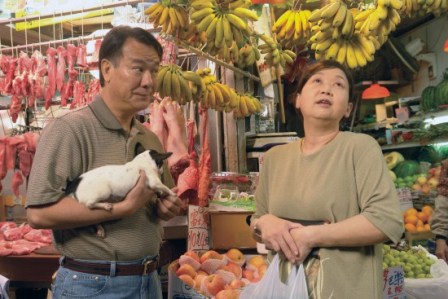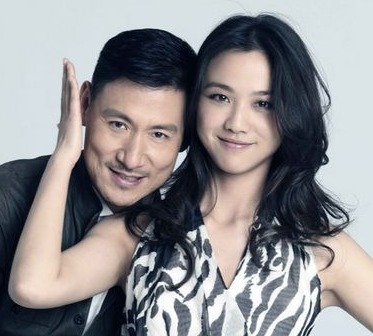July 13th, 2010
May-December Rhapsody

Jacky Cheung and Tang Wei in Crossing Hennessy
Ivy Ho has written screenplays for a number of Hong Kong films, two of which — Comrades, Almost A Love Story (1996) and July Rhapsody (2001) – rank amongst my favorite Chinese films of all time. I haven’t had a chance to watch Ho’s directorial debut, Claustropobia (2008), but when I heard that Jacky Cheung and Lust, Caution’s Tang Wei would be starring in her second film, Crossing Hennessy, I just had to check it out.
And now I have.
To be honest, I really wanted to love Crossing Hennessy, but in the end, I only kind of liked it. The premise certainly intrigued me. In the film, two people are forced by their respective guardians to meet up, albeit with the added expectation that maybe the two of them will get hitched sometime in the near future. One problem — both the man and the woman are “involved” with other people. Forty-year-old bachelor (but not virgin) Loy (Jacky Cheung) lives at home and is still hung up on his childhood ex (Maggie Cheung Ho-Yee), while Oi Lin (Tang Wei) has a hot-tempered boyfriend named Xu (Andy On) who’s biding his time in jail. With Loy’s ex now single again, and Xu soon to be released, it’s no surprise that our protagonists’ hearts are elsewhere.

Despite their initial lack of interest in both the matchmaking scheme and each other, the two of them try to humor their guardians, eventually striking up a tentative friendship thanks to a chance encounter, some tea, and a shared love of detective novels. You can guess what happens next. Actually, no, you can’t. If you’re expecting a budding romance to occur in typical romantic comedy fashion, well, let’s just say you’ll be somewhat disappointed.
The one thing I really like about Crossing Hennessy is the subtlety and restraint Ivy Ho utilizes in presenting her story, particularly in the sections featuring Tang Wei. Basically, what the characters think or feel about a particular situation is often revealed only through a look, a gesture, or body language. An internal life is never fully divulged for any of these characters. You have to fill in the blanks yourself. And I don’t have a problem with that; what I do have a problem with is an uneven narrative.
Throughout the film, we get a substantial understanding of what’s going on with Jacky Cheung’s character, as a) we see his home, work , and personal life constantly, b) Loy has regular “meetings” with his deceased father (Lowell Lo) in his dreams, and c) Loy isn’t afraid to declare his thoughts and feelings at story’s end. We don’t really get any of that with Tang Wei’s character. It’s an interesting contradiction — as is, I think Oi Lin’s storyline got the short shrift in comparison, but in terms of execution it’s far superior than the happenings in Loy’s narrative arc. I think a large part of that has to do with Tang Wei’s acting, as well as Ivy Ho’s trust in letting the quiet moments speak for themselves. The exorbitant focus on Loy’s life is by no means “better,” but the sheer amount of screen time dedicated to it does make me wish some of that was spent on Oi Lin’s arc instead.
And sometimes, it really feels like something is missing. In a scene late in the film, Loy meets Xu, and what transpires is apropos of nothing. Although we as viewers can guess what happened to spur this event, it doesn’t make sense as the film gives little evidence that Oi Lin even talks about Loy to Xu. Even if no “bridge” scene was shot, it registers as a sequence left on the cutting room floor.

My interest in this subplot = 0
The focus on Loy’s life revolves mainly around three characters — his mother, Mrs. Chiang (Bau Hei-Jing), her accountant-turned-love interest (Danny Lee), and her spinster sister (Mimi Chu). While it’s refreshing that Crossing Hennessy would give plenty of screentime to older actors (not your typical matinee idols), this focus on the supporting characters takes away from the main plot. Still, I understand why they are present in the film. Even though Loy may not state it outright, his mother and his auntie are, from a certain point of view, visions of his own possible future. In his auntie, he sees a lifelong spinster, which is what he may become at the rate he’s going. In his mother, he sees the life he could have as well. His mother has loved and lost (Loy’s Dad), but yearns to love again (Danny Lee’s dog-loving character). The problem with this subplot is that it doesn’t support the main plot, but instead detracts from it. Aside from a nice little acting turn by Mimi Chu, the whole thing seems overdone.
The more I think about the film, the more I feel like it’s potential was wasted. I mean, the film sounds interesting at face value. The May-December/mismatched love plot, the detective story angle, and the possibly magical aspect (the prospective couple keep seeing this mysterious Indian man) all seem all ripe for a really entertaining melodrama. But the tension between being a mainstream romantic comedy and a more artsy drama are never quite resolved satisfactorily. The film’s tone — neither overtly funny nor as drama-heavy as it could be — makes for an uneven viewing experience. I never understood how these two could fall for each other, as much of it happens off-screen. They simply needed additional scenes together to make the possibility for romance seem more credible. The ending doesn’t seem earned at all.
I hate to nitpick, but — despite some interesting compositions in Tang Wei’s scenes — the overall look of the film is flat and uninteresting. The soundtrack wasn’t up to snuff either, as it seemed to go for the corniest music cues when silence — in lieu of a better soundtrack — would have sufficed. I understand that Crossing Hennessy deals with the romantic plight of ordinary folks, but that doesn’t mean the look and sound of the film should be completely run-of-the-mill. Maybe I’m being unfair in comparing it to Comrades, Almost A Love Story, July Rhapsody, and the Wong Kar-Wai oevre, but considering the storyline, it’s hard not to make (hope for?) those connections. Sadly, Crossing Hennessy isn’t quite in the same league. Am I wrong to want films to make me feel — in new and different ways — the way I felt during the last scene of Chungking Express? Maybe I am.

Please do another movie together.
Having said all that, the truth is that, several days after watching Crossing Hennessy, I’m still mulling it over. Jacky Cheung turns in a pretty good — although not that funny — performance, but the real revelation here is Tang Wei. Charismatic, natural, and fun to watch, Tang Wei is a star in the making. With this and the challenging Lust, Caution behind her, I’m expecting good things from her in the future. Oh, and in a very small amount of screentime, Andy On impressed me a lot.
And despite my quibbles with the film, I’m curious to see the next trick up Ivy Ho’s sleeve. She’s got an original voice and point of view — the raw potential for something truly moving and invigorating is all there in Crossing Hennessy, even if the final assemblage left a lot to be desired.

